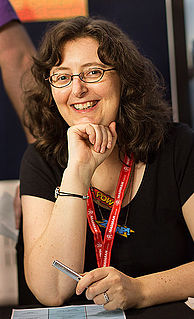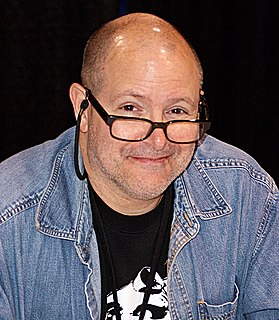A Quote by Trudi Canavan
I always love writing the third book in a series because you get to tie up all the threads that you put out in the first two books. You finally let people know what really happens and reveal all the secrets and bring certain characters together.
Related Quotes
When I'm writing for a book, it's much more reflective process. I have certain things that may not translate well to the stage, but, when they're on the page, people can really get into them. My first two books were aiming to be funnier, but the third was more about deep exploration. Things about being a parent and growing older that I thought would be perfect for a book.
Parker wasn't supposed to be a series. He was supposed to be one book, and if he was only going to be in one book, I didn't worry about it. And then an editor at Pocket Books said "Write more books about him." So I didn't go back at that point and give him a first name. If I'd known he would've been a series, I would've done two things differently. First, I would've given him a first name because that means for 27 books, I've had to find some other way to say, "Parker parked the car."
I can't single out one of my books or characters as a favorite. In the same way that I don't have a favorite kidney, my books are organically all part of myself. I might even say that put all together, the books are one ongoing, developing story - which, not coincidentally, happens to be my own lifestory.
I've published over 100 books - and that is divided about 50/50 adult and young adult. Lately, I have been writing more YA, which is such a great genre to write it. I don't have a favourite (I usually say it's the last book I've written), but certain books do stick in the mind. My very first YA novel, The Children of Lir, will always be special to me, and, of course The Alchemyst because it was a series I'd wanted to write for ages.
Blogging has mostly been an opportunity to react more immediately to experiences to try out ideas that I may end up using in the print media or in some other place. When I write books, it's a way for me to bring readers into the experience of writing the book, all through the process of writing the books that I write. I talk about what I'm up to in the blog. I let people know what I am doing. To me, it's just part of putting my professional life up in a way that people who are interested in it can access; and learning things from them as well.
I look at all of world mythology and folklore as my toy to play with. There are just so many characters and creatures there I want to put on paper. It's a really exciting thing for me to take material that I really love and put a new coat of paint on it and present it to this audience. And I don't have to make up any of the characters. I can just pull a book of mythology off the shelf and say, "I'll use this guy." I also hate making up names for fantasy characters. I'll just flip through these books and say, "Wow, this is way crazier than anything I could make up".
People come, people go – they’ll drift in and out of your life, almost like characters in a favorite book. When you finally close the cover, the characters have told their story and you start up again with another book, complete with new characters and adventures. Then you find yourself focusing on the new ones, not the ones from the past.
I try to outline. I'm a lazy outliner. I will put the points down of each chapter or series of chapters, but it always changes. For me it's a place of evolution. I don't really know who the characters are. I don't really know what the story is. I outline and that really just gets me moving. It's like I'm drawing up fake maps, but they turn out to be correct.
I have always employed humor, and I think it’s absolutely crucial that we do because, among other things, humor is the only free emotion. I mean, you can compel fear, as we know. You can compel love, actually, if somebody is isolated and dependent — it’s like the Stockholm syndrome. But you can’t compel laughter. It happens when two things come together and make a third unexpectedly. It happens when you learn something, too.






































